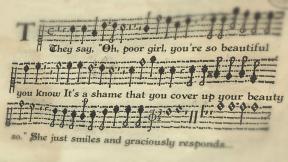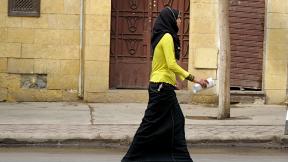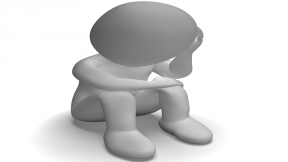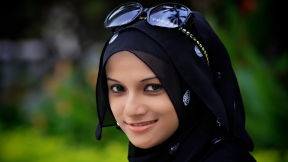
No "special report" about Islam in America, like that offered by Newsweek Magazine in its July 30, 2007 issue, can be complete without the ever-fascinating topic of Hijab.
While the magazine's feature piece noted that, "according to a 2002 study from Hamilton College, more than a third of Muslim American women now wear the veil every day," the only article on the Hijab in the publication's online version of the issue was an interview with Karima Berkani of Madison, Wisconsin, a Muslim American political activist in Palestinian and anti-Iraq War movements who no longer wears Hijab.
She cites discrimination as the reason she decided to take off the Hijab post-9/11 but doesn't hesitate to add, "my personal interpretation of what Islam is asking of me is that I dress modestly. I don't think the Qur'an insists on the hijab, I don't think it's required of me..."
Highlighting women who have chosen to stop wearing Hijab is not without reason. It seems to be part of a growing trend to label Hijab and those who continue to wear it as less American and more "moderate" Muslims. It's the same argument that the detractors of this "piece of cloth" have made for centuries, that Islamic dress is less civilized and hardly "empowering" to women. But there's a new twist: Fatwa-passing from any and every Muslim about the status of Hijab as something that is not an obligation of the faith, as it has been deemed by scholars, both men and women, throughout 14-plus centuries of Islam.
There is no question that wearing Hijab in post-9/11 America is hard. Even a cursory glance at the subject lines of the Council on American-Islamic Relations' almost daily emails recount incidents of Muslim women in Hijab being spat at, physically attacked, threatened and discriminated against on the job, in schools and stores.
A 2007 study led by Dr. Neeraj Kaushal, Assistant Professor at the Columbia University School of Social Work found that earnings of Arab and Muslim men fell 10 percent subsequent to the 9/11 attacks. No study has yet been done about the financial fallout on American Muslim women. However, if conducted, it would probably quantify the stories of suffering Muslim women have endured that circulate within the community. Some Muslim women have chosen to take off the Hijab to maintain their livelihood, especially in cases where they are the sole supporters of their families. Others have chosen to completely leave the workforce so that they can maintain Hijab, despite the fact that many of them hold post-graduate degrees, are more than qualified to seek employment and want to further their careers.
A 2002 study from Toronto, Canada entitled "No Hijab is Permitted Here" did look into the issue in relation to Canadian Muslim women and found that employers in one of the world's most diverse cities often reject women in Hijab, selecting identical candidates without the headcover for jobs.
But along with these negative stories are the positive strides forward: cases of Hijab discrimination that have been brought before courts and succeeded in strengthening constitutional guarantees of the right to freedom of worship and religious practice for members of all faiths; financial compensation for Muslim women in Hijab who have been discriminated against; apologies from some schools and changes in the policies of some of the biggest companies in corporate America. Muslim women have and continue to fight hard for Hijab and in the most religiously diverse nation on the planet, have almost always won against Islamophobia.
The new war on Hijab is part of the holy triumvirate of "moderate" Islam: Hijab, homosexuality and hootch (alcohol); Hijab is not sanctioned by the Quran, homosexuality is Islamically acceptable and alcohol is permissible, according to many of the post-9/11 neo-Shaikhs. The source of their decrees: personal opinion or interpretation and/or selective readings of the Quran and Islamic texts in general.
Some choose only the first view, while rejecting the other two. Those with a more radical agenda to build "moderate Muslim networks" in the service of today's imperialism, like that advanced by think-tanks like the RAND Corporation, advocate all three views.
The situation of Muslims living in post-9/11 America may change how we negotiate these three and other challenges. But it does not alter the Islamic stance on these issues, just as it did not in the past. You can check the Quran Hijab Quotes for further details. Hijab remains an obligation; homosexuality is still a sin, as is drinking alcohol.
In the land of opportunity, a person is free to choose or not to choose wearing Hijab, practicing homosexuality and drinking, as well as to spout personal opinions about any or all of these issues. But let us not forget that truth is truth, and truth is based on knowledge. That is the starting point of any discussion about any aspect of Islam in America or anywhere else.
Zharif the Future Surgeon's - http://commons.wikimedia.org/wiki/File:3504796495_b-spring-fest-016.jpg








Add new comment